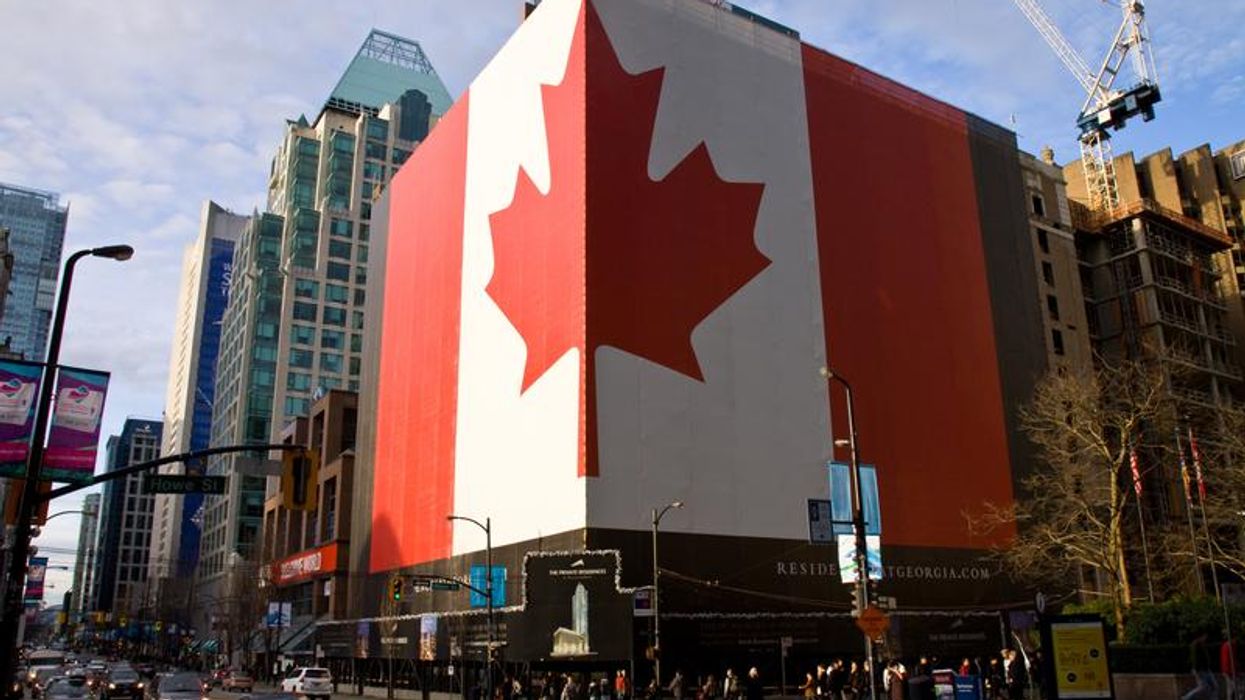5 Ways To Improve Your CRS Score For A Better Shot At Canada's Express Entry Draw
Planning on settling in Canada?

A Canadian flag on a building in Vancouver.
If you're planning to move to Canada, or are already in the country and applying for permanent residency, the Express Entry draw might be at the top of your mind right now.
Every few weeks, Immigration Refugees and Citizenship Canada (IRCC) holds an Express Entry Draw, which selects people for immigration to Canada.
The selection is based on Comprehensive Ranking System (CRS) scores, and individuals with high CRS scores have a higher chance of getting selected.
However, the CRS score cut-off has recently been on the higher side, at 489.
This means that a lot of well-qualified people, both within Canada and outside of it, might be missing the mark by just a few points.
To help, Narcity sat down with Franklin Rodriguez — Canadian immigration consultant behind Mi Casa Canada Immigration Services — to get a better idea of what applicants can do to increase their scores and improve their chances of being selected.
Improve your English language skills
Possibly the easiest way to improve your score, albeit a slightly more expensive option, is to improve your English language skills on paper, Rodriguez says.
For this, you'd have to retake your English language test (like the IELTS) and get a higher score which can instantly boost your points.
"There are free YouTube videos that you can watch and practice tests you can take to help you with that," adds Rodriguez.
Learn French
If you're pretty proficient in English and have already maxed the points you can get there, another route to take would be to learn another language – specifically, French.
"Once you learn French, not only will you get more points on your CRS score, [but] French opens many other possibilities when it comes to immigration," says Rodriguez.
As he points out, it does more than just boost your Express Entry profile.
It can also improve other aspects of your life in Canada, from job prospects, to meeting and communicating with new people.
Applying directly to provinces
If you're not set on going to a specific province or region of Canada, applying directly to specific areas is another way to go.
"When you create an express entry profile, you can show interest in being nominated for one or all provinces. However, you can also apply directly to provinces and ask for that nomination," Rodriguez says.
"Be proactive and approach it from both angles," he advises.
Securing a provincial nomination gives your profile more express entry points, and the chances of getting an invitation are then higher.
"So, scan all province's immigration programs, see which program is a better fit for you, and apply to that program. It is time-consuming, but can lead to more points and an eventual invitation."
Get more work experience
This is a great one, whether you're inside Canada already or not.
"If you are on a work permit, you can get more work experience. As time goes by, and you're in the pool as a candidate, your work experience will be only increasing."
This can help you as more work experience equals more points.
Consider further education
If you are looking to upskill while also increasing your chances of becoming a Canadian permanent resident, it might be time to think about your degrees.
"If you got a bachelor's degree back home and a master's degree in Canada, ensure you get that degree from another country assessed against Canadian education standards," says Rodriguez.
There are organizations, like World Education Services, that do exactly that.
"Or, even better, you can pursue a second degree or accreditation in Canada. More education whether it's in Canada or outside of Canada can potentially lead to more points," he adds.
If you are keen on going down this path, there's loads of benefits of having Canadian permanent residency or citizenship. And, yes, there are some big differences between the two.
This article's cover image was used for illustrative purposes only.
- Newcomers To Canada Are Eligible For So Many Free Services & It's Not Hard To Sign Up ›
- New Canadians Can Get Free Admission To Over A Thousand Spots Across Canada & Here's How ›
- 4 Big Benefits Of Having Permanent Resident Status In Canada & How You Can Get It ›
- 6 Things I Wish I Knew Before I Came To Canada As An International Student - Narcity ›